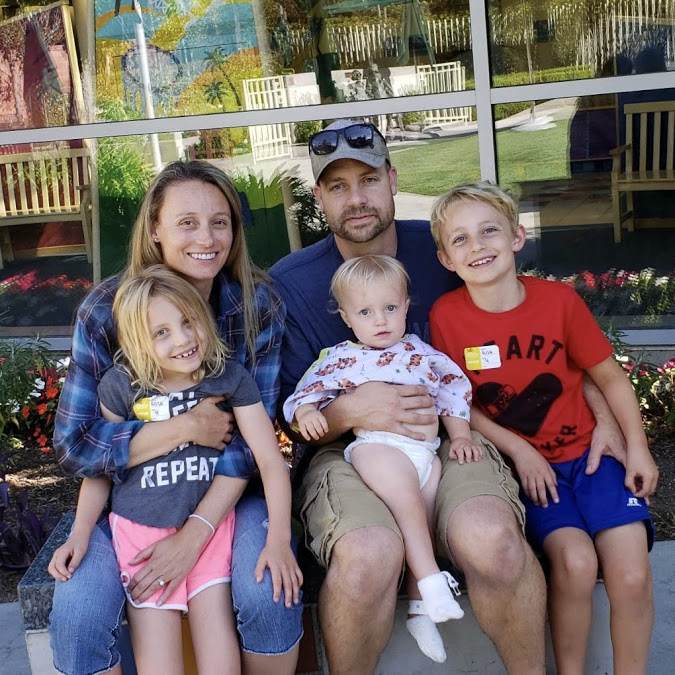Dealing with Incomprehensible Grief
A Mother Reflects on Losing Her 20-Month-Old Son to Brain Cancer

On July 31, 2019, my husband and I heard the words no parent ever expects to hear: “Your child has a brain tumor.” Our son Aiden was diagnosed with atypical teratoid/rhabdoid tumor or AT/RT. We spent the next four months at Children’s Hospital Los Angeles fighting a beast that affects fewer than 60 children a year nationwide. We thought Aiden would beat it. Sadly, a fungus that you and I breathe in and out all day took its toll on our sweet boy, and he died from complications at the onset of surgery. It was November 12, at 2:10 in the afternoon. He was 20 months old.
My husband and I spent every moment advocating for Aiden, ensuring he was comfortable, happy, and safe. Like hitting a brick wall at 60 miles per hour, all of that stopped, and we found ourselves driving home with an empty car seat. We then had the excruciating task of telling our two older children that the baby brother they had gushed over since day one had died. They said all the things we were feeling. “He was just a baby!” “It’s not even Christmas!” and “I wish I didn’t know.” That last one really got me. Twelve hours earlier, I was holding my baby. And before his neurosurgeon said the words, “I’m so sorry,” he was still alive. I wish I didn’t know either.
New grief is physical, raw, and disorienting. I had trouble being with people and being without people. I couldn’t move, and I couldn’t sit still. I desperately wanted to talk about Aiden, and at the same time, I couldn’t form a sentence. This is why we have the phrase “I’m so sorry for your loss.” It isn’t cliché; it’s true. Aiden was here, and now he is gone. He and I and everyone who loved him are now lost. It’s like having an aching phantom limb. I often grip my chest, looking for his soft skin.
It’s been three months since I’ve held my baby’s hand. Three months since I’ve kissed his forehead or rubbed my cheek against his. Three months since our lives were ripped apart. It feels like an instant and forever at the same time. The funeral home made a cast of Aiden’s hand. I knew it would feel special because everything he touched feels special to me, but I was shocked by how quickly I recognized it as his hand. It’s his fingers. His chubby palm. His knuckle dimples.
The moment you welcome a child into your family, it’s like all of a sudden you discover a part of your heart you didn’t know was there. When Aiden died, that part of my heart was ripped out, and all of the love I had been pouring into him had nowhere to go. They say this is the definition of grief: love with nowhere to go. In between grieving and living, I had a thought: “What if Aiden needs that part of my heart with him? What if he misses us too? What if the love we have for him does have a place to go?” The hospital gave us a necklace with two hearts, one that fits inside the other. As we were saying our goodbyes to our son, I placed the smaller one in his hand and tied the string around his wrist. When I find myself in a dark place, I imagine his chubby hand holding my heart, and I feel a little bit better.
I sit here in my bed, looking at my baby’s empty crib, and know my heart will be breaking for a long time. I move from anger to sadness to disbelief all in one breath. My baby had brain cancer, and then he died. I look at these words, and I still don’t believe them, not really. To be honest, I’m still in shock over his diagnosis.
The Cave Fire broke out 12 days after Aiden died. Then, just three days later, the mountain was covered in snow. It is a perfect metaphor for my life at the moment: scorched earth followed by a soft blanket and a long healing process. It will take years for that mountain to heal, and some parts will never recover. I find comfort in knowing there is no finish line.
None of us who are brave enough to love will escape this life without grief. It is the unfortunate price of joy. I don’t have to accept my baby’s death, but grief becomes much more manageable when I let go of expectations and accept that this is supposed to hurt, this is supposed to be hard, and that it doesn’t have to get better every day. You do not move on or get over it; you move forward with it.


